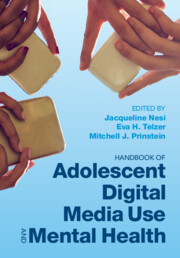Handbook of Adolescent Digital Media Use and Mental Health
Digital media, including social media, has fundamentally changed how the human species communicates with, relates to, and influences one another. Adolescents use digital media extensively. Researchers, scholars, teachers, parents, and teens themselves have many questions about the effects of digital media on young people’s psychological development. This handbook offers a comprehensive synthesis of scientific studies that explain what we know so far about digital media and its effects on youth mental health. With chapters from internationally renowned experts in the fields of psychology, psychiatry, media, and communications, the book offers a broad overview of the positive and negative implications of youths’ engagement with digital media for brain development, relationships, identity exploration, daily behaviors, and psychological symptoms. Chapters include a discussion of the current state of knowledge, directions for future research, and practical suggestions for parents, educators, and teens themselves. This title is also available as Open Access on Cambridge Core.
Jacqueline Nesi is an Assistant Professor in the Department of Psychiatry and Human Behavior at the Warren Alpert Medical School of Brown University.
Eva H. Telzer is an Associate Professor of Psychology and Neuroscience at the University of North Carolina at Chapel Hill and Co-Director of the Winston National Center on Technology Use, Brain, and Psychological Development.
Mitchell J. Prinstein is the John Van Seters Distinguished Professor of Psychology and Neuroscience at the University of North Carolina at Chapel Hill, the Chief Science Officer at the American Psychological Association, and Co-Director of the Winston National Center on Technology Use, Brain, and Psychological Development.



